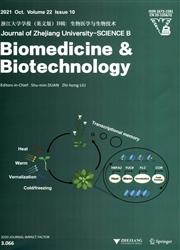黑穗子细胞外黑色素的理化性质、分子结构、抗氧化活性及生物学功能
IF 4.7
3区 生物学
Q1 BIOCHEMISTRY & MOLECULAR BIOLOGY
引用次数: 2
摘要
含有深色色素的api Ascosphaera孢子感染蜜蜂幼虫,导致蜂群因白垩病而大规模崩溃。然而,人们对这种色素知之甚少,也不知道它是否在蜜蜂感染中起作用。本研究采用碱萃取、酸水解、反复沉淀等方法分离色素。紫外(UV)分析表明,该色素的色值为273,最大吸收峰在195 nm处,具有较高的碱溶解度(7.67%)和酸沉淀性。进一步的化学结构分析,包括元素组成、傅里叶变换红外(FTIR)光谱、拉曼光谱、质谱和核磁共振(NMR),证明该色素是一种具有典型吲哚结构的真黑色素。黑色素的分子式为C10H6O4N2,分子量为409da。黑色素有羟基、羧基、氨基和酚基,可以潜在地与金属离子螯合。抗氧化功能分析表明,api黑素对超氧自由基、羟基自由基和2,2-二苯基-1- picrylhyrazyl (DPPH)自由基具有较强的清除活性,对Fe3+具有较强的还原能力。间接免疫荧光(IFA)、扫描电镜(SEM)和透射电镜(TEM)分析表明,apis apis的黑色素位于孢子壁上。真菌黑色素的孢子壁定位、抗氧化活性和金属离子螯合特性被认为与孢子的致病性有关。然而,进一步的感染实验表明,缺乏黑色素的孢子并没有降低蜜蜂幼虫的死亡率,这表明黑色素并没有增加蜜蜂孢子的毒力。本研究首次报道了api产生的黑色素,为进一步研究其在api中的作用提供了重要的背景参考。本文章由计算机程序翻译,如有差异,请以英文原文为准。
Physicochemical properties, molecular structure, antioxidant activity, and biological function of extracellular melanin from Ascosphaera apis
Ascosphaera apis spores containing a dark-colored pigment infect honeybee larvae, resulting in a large-scale collapse of the bee colony due to chalkbrood disease. However, little is known about the pigment or whether it plays a role in bee infection caused by A. apis. In this study, the pigment was isolated by alkali extraction, acid hydrolysis, and repeated precipitation. Ultraviolet (UV) analysis revealed that the pigment had a color value of 273, a maximum absorption peak at 195 nm, and a high alkaline solubility (7.67%) and acid precipitability. Further chemical structure analysis of the pigment, including elemental composition, Fourier transform infrared (FTIR) spectroscopy, Raman spectroscopy, mass spectrometry, and nuclear magnetic resonance (NMR), proved that it was a eumelanin with a typical indole structure. The molecular formula of melanin is C10H6O4N2, and its molecular weight is 409 Da. Melanin has hydroxyl, carboxyl, amino, and phenolic groups that can potentially chelate to metal ions. Antioxidant function analyses showed that A. apis melanin had a high scavenging activity against superoxide, hydroxyl, and 2,2-diphenyl-1-picrylhyclrazyl (DPPH) radicals, and a high reducing ability to Fe3+. Indirect immunofluorescence assay (IFA), scanning electron microscopy (SEM), and transmission electron microscopy (TEM) analyses showed that A. apis melanin was located on the spore wall. The spore wall localization, antioxidant activity, and metal ion chelating properties of fungal melanin have been suggested to contribute to spore pathogenicity. However, further infection experiments showed that melanin-deficient spores did not reduce the mortality of bee larvae, indicating that melanin does not increase the virulence of A. apis spores. This study is the first report on melanin produced by A. apis, providing an important background reference for further study on its role in A. apis.
求助全文
通过发布文献求助,成功后即可免费获取论文全文。
去求助
来源期刊

Journal of Zhejiang University SCIENCE B
生物-生化与分子生物学
CiteScore
8.70
自引率
13.70%
发文量
2125
审稿时长
3.0 months
期刊介绍:
Journal of Zheijang University SCIENCE B - Biomedicine & Biotechnology is an international journal that aims to present the latest development and achievements in scientific research in China and abroad to the world’s scientific community.
JZUS-B covers research in Biomedicine and Biotechnology and Biochemistry and topics related to life science subjects, such as Plant and Animal Sciences, Environment and Resource etc.
 求助内容:
求助内容: 应助结果提醒方式:
应助结果提醒方式:


